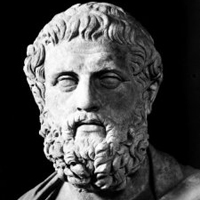Greek Tragic Vision Reflected in Oedipus Rex
A Drama played a central role in the life of Greek people. It is in Greek times that the greatest tragedies were written. Greek tragic vision is reflected through these tragedies. Since they were religious people they saw the great role of fate in making life happy or sorrowful.

Sophocles
The divine power was the key force behind the disintegration of man. Those who didn’t practice moderation and crossed the limits of life would be punished by the divine force. The role of characters was also taken into account. However the redemptive power of tragedy provided wisdom through suffering. A study of Sophocles Oedipus Rex can give us insights into this Greek tragic vision.
Every human being has certain limits and he should conduct life within those limits. A person cannot accomplish everything. Arrogance in excess will ultimately bring out the downfall of the person concerned. Moderation is a virtue that people should practice in order to avoid the possible catastrophe in life. The hubris is a weakness in the character of a protagonist and his fall is made inevitable because fate operates in collaboration with the weakness in the personality to bring about the downfall of that person. These two forces operate in such a way that the catastrophe is made to seem inevitable. Before the final moment comes the protagonist has to pass through a series of testing circumstances that try his power, patience, and endurance. The suffering is so great and intense that the people watching can’t help feeling pity and fear. The suffering is not in proportion to the crime committed. Oedipus is a noble character, but his fall is made inevitable because of his arrogance and the fate was operating invisibly.
While in power Oedipus acted bossy rebuking and accusing people who were under his authority as a king. Oedipus shouldn’t have acted arrogantly while at the peak of fortune and should have thought about the potential misfortune that could befall him any time in future. This is the lesson imparted by the play. Oedipus’s suffering is so intense and heartrending that we are deeply moved by it. The whole plot of the play is built around irony. Oedipus’s parents had handed him down to a shepherd so that they would be able to avoid the terrible fate, according to which the infant would later kill his father and marry his mother. In keeping with the proverb, ‘What is looted can’t be blotted’, Oedipus kills his father and marries his mother. The greatest irony is that father thinks he is moving away from the terrible fate. So, Oedipus Rex is rightly called the tragedy of fate. As a king Oedipus couldn’t see his people’s suffering. So he was determined to find out and punish the defiler of the city. Did he really have to take the investigation to its logical conclusion? To find an answer to this question we have to go to the question of fate. The circumstances of the play evolve in such a way that his fall is made inevitable. When Oedipus comes to know that he himself was the murderer of his father, he accepts the reality bravely. He doesn’t face his fate like a coward. He encounters it like a hero. There lies his greatness as a hero. The suffering he has endured now makes him a wise person. He has suffered so much that he has become a saint and no human suffering can touch him now. He has in one way, gained redemption through his suffering.
So, Greek tragic vision incorporates the idea of the role or fate and the hubris that exists in the character of the people. Though the final disintegration is too much to bear, one has to accept one’s moral responsibility, though the tragedy was mostly because of fate. One has to practice moderation in order to avoid any potential tragedy. Suffering is redemptive and the wisdom gained through it makes one mature.
Oedipus Rex Study Center
Tension between Individual and State in Oedipus Rex
The Reversal of Events in Oedipus Rex
Plot Construction in Oedipus Rex
Dramatic Technique in Oedipus Rex
Oedipus Rex as a Classical Tragedy
Exploration into Man's Nature in Oedipus Rex
Rationalist and Fatalist view in Oedipus Rex
 |
bachelorandmaster.com |